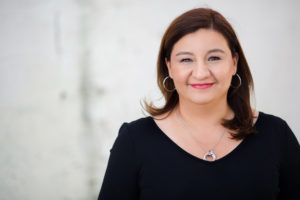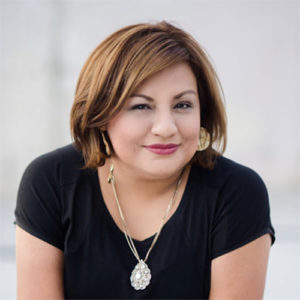“The first time I met someone from The Denver Foundation was during my first year walking again.”
Indira Guzman is reflecting on her journey with the Community Language Cooperative (CLC), a worker-owned company with six full-time employees and many part-time employees, all earning a livable wage. It is the largest translation and interpretation company in Colorado, passing the $1 million dollar mark in revenues early in its life.
“I began interpreting from home sometimes, over the phone, during my recuperation from my car accident.” Indira learned about worker-owned cooperatives while interpreting for Westwood Unidos, in her mom’s neighborhood. The Denver Foundation was exploring the topic of co-ops at about the same time Indira was walking again. “Could I begin a worker-owned co-op with some of the interpreters I knew?” she wondered aloud.
Coaching support, a core team, and a small grant: birthing a worker-owned co-op
As The Denver Foundation (TDF) did not know much about worker-owned co-ops at the time, CLC and TDF learned together. “My first coach was Amy Beres.” I had to switch from an individualistic mindset to a cooperative company mindset, where a group of us would all be owners of this new company.”

Beres, who at the time was working through a TDF grant to the Rocky Mountain Farmers Union to help develop co-ops, worked with Indira first. She then met regularly with Indira’s emerging core group: Indira’s sister Rosa Snyder, and fellow part-time interpreter, Claudia Lopez. They developed their first prototype for CLC by offering interpreting services wherever they could within their Westwood neighborhood. With the help of Mi Casa, a long-time entrepreneur development organization also funded by TDF and Beres, CLC developed their first business plan. “At first we borrowed Westwood Unidos’ interpretation equipment, but the demand grew and we used our first Strengthening Neighborhood grant to match the money we had saved and buy our own interpretation equipment.”
“I took an online class through Mi Casa Resource Center on starting your own business. I learned how to use QuickBooks, and draft marketing information,“ Indira recalls. “I would then meet with Rosy and Claudia and teach them all I had learned in the online class.” Indira now recommends that every co-op she meets has at least one member taking business classes, to then be re-taught to the group.
A co-op’s values lens its most cherished feature
“I’m proudest of the language justice framework we now use,” Indira declares. “This didn’t come from us. This came from the community.” (you can contact CLC through their website to access their justice framework).

What is the Language Justice Framework? At its essential core, it requires folk with power, who often only speak English, to put on the interpretation headsets themselves. Before this framework was established, Indira would only have the Spanish speakers put on headsets while Westwood Unidos met with the mayor, for instance. By having everyone put on a headset, the “playing field” is flattened, somewhat. But, as a business that practices affirmative action, CLC’s language justice framework usually posits that the language of the community be prioritized during all interpretation sessions. For example, during a session at a large community meeting with Spanish-speaking constituents where only the mayor and his staff do not speak Spanish, CLC gives the interpretation headsets to the English speakers present for the meeting, empowering neighborhood leaders to conduct the meeting entirely in Spanish, with interpretation for the “guests”: the mayor, and his staff.
CLC practiced piloting and implementing their Language Justice Framework at TDF’s Community Organizing Institute, insisting that all participants use a headset. “Funders need to give their grantees grace, letting them learn by doing. Sometimes the headsets wouldn’t work. Sometimes the interpretation quality varied in different languages. Give your grantees the space to learn and continue to improve.”
The second grant
CLC claims that its second — and last — grant from TDF, for technical assistance to develop a website with electronic billing capacity, ultimately led to CLC’s exponential growth. Following the technical assistance grant, any nonprofit agency that wanted to hire CLC was able to pay them with a credit card. Even The Denver Foundation became a customer of CLC, hiring them to interpret for all programs and meeting with constituents.
As they’ve grown, CLC has learned that the demand for their work stretched beyond their Westwood neighborhood. Their contracts with the City and County of Denver began early, and have remained consistent. Demand has come from throughout Colorado’s Front Range, from every kind of governmental agency, and other local foundations. CLC immediately responded by hiring both full-time and part-time staff and interpreters, incorporating traveling, training, and equipment purchase into the costs of doing business.
If you are successful, you should become attractive to other funders
The CLC staff had met future Colorado Trust staff while interpreting at a community-organizing workshop sponsored by The Denver Foundation.
“The Colorado Trust gave us the grant to develop a curriculum around Language Justice, which was first developed strictly for our own work in Westwood. We created a framework and we created a manual in 2019. We trained about 12 groups throughout Colorado.”
The first crisis
“We didn’t think it through.” Rosa Snyder, one of the CLC owners, candidly shared with TDF the fact the CLC was considering dissolving as cash flow issues became harder and harder to manage. Luckily, CLC had developed connections with a new coaching team: Yessica Holguín and Carlos Valverde. The coaching team helped put the company back into the black. “We have a government and foundation bill rate now, and we have a (more affordable) grassroots rate,” says Guzman. Yessica and Carlos reminded them that as a worker-owned cooperative, they might want to begin considering helping other worker-owned interpretation cooperatives grow in parts of the state that were difficult for CLC to serve.
“The CLC does not have the capacity to fulfill the requests from each individual community. We believe that people from their own communities should develop co-ops to work in their own community. We want to grow that model. That’s why we want other communities to develop their own co-ops and their own way of doing things through a language justice model. I’m now working with a coach to help an interpretation worker-owned co-op develop in the San Luis Valley called the San Luis Valley Language Justice Cooperative,” Indira shares. “We want every community to have their own interpreters that they use. The coach tells the new co-ops the philosophy and trajectory of how to launch and cultivate the co-op. I, of course, share my lived experience of what not to do as they build their co-op.”
How key is the coach? “Our coaches gave us the business-savvy insights on how to manage our business, and that’s going to help everyone,” says Indira.
Renewed growth
I took 54 business trips by the airport before COVID. We were beginning to do some work nationally. Then, all meetings needed face-to-face interpretation for all customers.
“Since COVID, I’ve only traveled once — to Mexico and came back. I was missing this non-travel time.”
The CLC is interpreting through Zoom for governmental agencies in other states and helping with community outreach for a health center in Massachusetts. They also provide translations for other state agencies, now with expertise in up to 12 languages.
“Since COVID, we’ve doubled our size.”
How could the business stop, adapt, and then grow in size during COVID?
CLC thought they had reached their peak before COVID. “Actually, we were at 38 worker-owners. After COVID, there were six of us left.
Five of the six counted on the co-op as their major source of income. Most other interpreters worked at CLC for secondary income.
The six that were left decided to invest $250/month on a Zoom membership, “and that was at a time where everything had canceled.” The question to the worker-owners: “Do you think we’re going to make enough to pay our Zoom bill, at least?”
“We had to learn how Zoom works, how interpretation on Zoom works, and then met with organizations over the first two months of COVID, unpaid, to discuss how interpretation on Zoom worked and spent some time working with community members showing them how to use it.” Indira even had to teach TDF staff how to turn on the interpretation feature on zoom. “It was sweat equity we had to put into the business. And we learned from our mistakes on Zoom.” (Tip: connect your computer to the internet with an Ethernet cable for the best, most consistent signal.)
“We’re doing a lot of Zoom interpreting. So we are training organizations on how to use Zoom interpreting, and we are putting our curriculum on a virtual platform [insert link]. We can now train interpreters nationwide.”
Since the onset of the COVID pandemic, CLC has reached a new high of 68 members, some worker-owners, and others just as contractors.
Do you have any advice for other co-ops
“Make sure other worker-owners in your co-op share the same values. We could not have developed the language justice framework if we did not have the same values.”
“Ask that your funder not just provide you seed capital. You need coaching, all along the way. Switching in your life to running a business is not natural -for most of us.”
“Be open to the changes you need to make in your business (for example, not everyone can be an interpreter all the time for a language co-op to thrive) so that you don’t burn out.”
What’s next
“COVID has opened up a virtual world where we can now work regionally and nationally more easily. We’ve learned that our people/our community adapts quickly to changes. And as we grow nationally, as a worker-owned co-op we are committed to working with other co-ops across the nation, to share the wealth.”
